
TEACHING SOCIOLOGY
Scope & Guideline
Transforming Teaching, Inspiring Inquiry.
Introduction
Aims and Scopes
- Pedagogical Innovation:
The journal emphasizes innovative teaching methodologies that enhance student engagement and learning outcomes in sociology courses. - Curriculum Development:
It seeks to explore and critique curriculum design, ensuring that it reflects contemporary sociological theories and practices. - Social Justice and Equity:
A core focus is on integrating themes of social justice, equity, and inclusion into sociological education, preparing students to understand and address societal inequalities. - Experiential and Community-Based Learning:
The journal promotes the incorporation of experiential learning opportunities, such as community-based projects, to connect theoretical knowledge with real-world applications. - Interdisciplinary Approaches:
It encourages interdisciplinary perspectives, integrating insights from other fields to enrich sociological teaching and learning.
Trending and Emerging
- Critical Pedagogy and Social Justice:
There is a growing trend towards critical pedagogy, emphasizing the importance of teaching sociology through the lens of social justice, equity, and inclusion. - Integration of Digital Tools and Resources:
Recent publications highlight the use of digital platforms and resources, such as online learning tools and social media, to enhance teaching and student interaction. - Experiential and Service Learning:
There is an increasing emphasis on experiential learning opportunities, including service learning and community engagement, as vital components of the sociology curriculum. - Focus on Underrepresented Voices:
Emerging themes include a focus on marginalized and underrepresented groups, with educators sharing strategies for incorporating diverse perspectives into the sociology classroom. - Innovative Assessment Strategies:
The journal is seeing more articles on innovative assessment techniques that prioritize student engagement, critical thinking, and practical application of sociological concepts.
Declining or Waning
- Traditional Lecture-Based Teaching:
There is a noticeable decrease in articles advocating for traditional lecture formats, as more educators favor interactive and student-centered learning approaches. - Focus on Basic Sociological Concepts:
Papers that concentrate solely on introductory concepts without integrating contemporary issues or innovative teaching methods are appearing less frequently. - Quantitative Methods in Teaching:
While quantitative methods remain important, there is a waning emphasis on quantitative literacy-focused articles compared to qualitative and experiential learning approaches. - Standard Assessment Techniques:
There is a decline in discussions surrounding conventional assessment methods, as educators increasingly explore alternative evaluation strategies that emphasize student engagement and learning processes.
Similar Journals
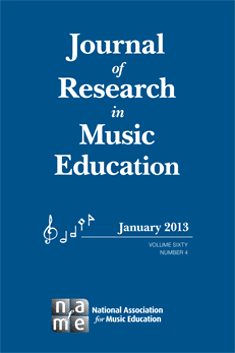
JOURNAL OF RESEARCH IN MUSIC EDUCATION
Fostering Excellence in Music PedagogyThe JOURNAL OF RESEARCH IN MUSIC EDUCATION, published by SAGE PUBLICATIONS INC, is a leading academic outlet in the field of music education, dedicated to advancing the study and understanding of music teaching and learning. With an impressive impact factor and classified in the Q1 category for both Education and Music, this journal plays a critical role in disseminating innovative research and insights that foster effective educational practices. Since its inception in 1953, it has maintained a rigorous peer-review process, contributing to its strong reputation within the academic community, as evidenced by its high rankings in Scopus. The journal's focus spans a wide range of topics, including pedagogical strategies, curriculum development, and the intersection of music and education policy, making it an essential resource for researchers, educators, and students alike. As it continues to evolve, users can explore a treasure trove of knowledge that supports the transformative power of music education in the 21st century.
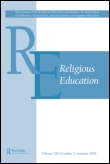
RELIGIOUS EDUCATION
Connecting Researchers and Practitioners in Spiritual LearningRELIGIOUS EDUCATION is a prestigious academic journal published by Taylor & Francis Inc, specializing in the interdisciplinary study of religious education and its impact on educational practices globally. Established in 1906 and converging through the years up to 2024, this journal serves as a crucial platform for researchers, educators, and practitioners interested in exploring the dynamics of religious instruction, policy, and faith-based educational methodologies. Despite not being an Open Access journal, it retains a strong reputation, holding a Q3 ranking in Education and an esteemed Q1 ranking in Religious Studies as of 2023. With its ISSN 0034-4087 and E-ISSN 1547-3201, RELIGIOUS EDUCATION offers a rigorous peer-reviewed forum that contributes significantly to the understanding of spirituality in education, making it an invaluable resource for those dedicated to advancing research and scholarship in this vital field.
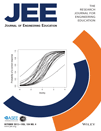
JOURNAL OF ENGINEERING EDUCATION
Empowering Educators to Transform Engineering EducationJOURNAL OF ENGINEERING EDUCATION, published by the American Society for Engineering Education, stands as a premier academic resource dedicated to the field of engineering education. With an impressive Q1 ranking in both Education and Engineering categories as of 2023, this journal emphasizes high-impact research that shapes pedagogical practices and advances engineering educational methodologies. Since its inception in 1969, it has fostered intellectual exchange and innovation within the community, earning a notable recognition as indicated by its Scopus rankings—#27 in Social Sciences Education and #14 in General Engineering. Although it does not provide open access, the journal welcomes submissions exploring diverse topics in engineering education, creating a platform for researchers and practitioners to examine trends, best practices, and outcomes in this vital area. By promoting scholarship that invigorates educational practices, the JOURNAL OF ENGINEERING EDUCATION is pivotal in influencing the future of engineering training and competency development.
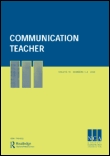
Communication Teacher
Bridging Theory and Practice in Communication Teaching.Communication Teacher, published by Taylor & Francis Ltd, is a pivotal academic journal focused on the realms of communication and education, with a strong emphasis on innovative teaching practices and pedagogical strategies. With its ISSN 1740-4622 and E-ISSN 1740-4630, the journal serves as a vital resource for scholars, educators, and practitioners seeking to enhance their understanding of communication education. Operating from the United Kingdom, it has garnered a respectable standing within its field, achieving a Q3 ranking in both Communication and Education categories as of 2023. Although currently operating without open access options, Communication Teacher continuously seeks to foster scholarly dialogue and collaboration among its community, covering a diverse range of topics aimed at improving communication skills in educational settings. Researchers and practitioners looking to stay abreast of the latest pedagogical advancements will find this journal an essential addition to their academic resources.

International Journal for Academic Development
Advancing educational excellence through scholarly insights.The International Journal for Academic Development, published by Routledge Journals, Taylor & Francis Ltd, is a leading scholarly platform dedicated to advancing the field of education. With an ISSN of 1360-144X and an E-ISSN of 1470-1324, this esteemed journal has garnered attention for its profound contributions, illustrated by its position in the Q2 category of the Education sector for the year 2023, and an impressive ranking of #380 out of 1543 in Scopus Ranks, placing it in the 75th percentile. The journal serves as a vital resource for researchers, professionals, and students who are engaged in academic development and pedagogical innovation from 2010 through 2024. While currently not an open access journal, it remains instrumental in disseminating impactful research aimed at shaping teaching practices and enhancing educational quality across diverse contexts. Set against the backdrop of its U.S. publication in Abingdon, England, the journal’s commitment to fostering a collaborative academic environment continues to attract a wide readership keen on exploring new educational paradigms.
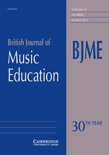
British Journal of Music Education
Empowering Educators with Cutting-Edge InsightsBritish Journal of Music Education is a prestigious academic publication dedicated to advancing the field of music education. Published by Cambridge University Press, it benefits from a notable impact factor that positions it in the Q2 category in Education and the Q1 category in Music as of 2023. This journal serves as a vital platform for researchers, educators, and students alike, focusing on innovative research, pedagogical studies, and theoretical discussions that shape the practice of music education globally. Since its inception in 1984, the journal has contributed significantly to the understanding of music pedagogy and continues to be relevant and influential, currently spanning the years from 1984 to 1998 and 2007 to 2024. With impressive rankings, including rank #16/180 in Arts and Humanities (Music) and rank #669/1543 in Social Sciences (Education) on Scopus, it highlights the journal's commitment to scholarly excellence. Though it does not currently offer open access, its contributions are an essential resource for anyone involved in the education landscape of music.

Journal of University Teaching and Learning Practice
Empowering Educators with Cutting-Edge ResearchWelcome to the Journal of University Teaching and Learning Practice, a premier publication dedicated to advancing research and practice in higher education. Published by UNIV WOLLONGONG, this journal provides a vital platform for educators, researchers, and practitioners to explore innovative teaching methodologies and learning strategies to enhance the university experience. With an impressive impact factor and categorized in the Q2 quartile for Education in 2023, this journal ranks in the top percentile of educational research, boasting a Scopus rank of 437 out of 1543 in Social Sciences Education. Since its inception in 2016, the journal has become a significant contributor to the field, fostering a scholarly dialogue among scholars from around the globe. Although currently not operating under an Open Access model, it offers valuable insights and is committed to publishing high-quality research that reflects best practices in educational settings. Join our community of academics dedicated to transforming university teaching and learning through rigorous scholarship and innovative practices.

JOURNAL FOR RESEARCH IN MATHEMATICS EDUCATION
Elevating mathematics education with cutting-edge research.The JOURNAL FOR RESEARCH IN MATHEMATICS EDUCATION, published by the NATIONAL COUNCIL OF TEACHERS OF MATHEMATICS (NCTM), stands as a premier platform for scholarly discourse in the realm of mathematics education. With an impactful position bolstered by Q1 rankings in both Education and Miscellaneous Mathematics for 2023, this journal has gained notable recognition, ranking 6th out of 90 in the mathematics category and 261st out of 1543 in social sciences education on Scopus. Spanning research outputs from 1996 to 2024, it serves as an invaluable resource for educators, researchers, and students alike, fostering an understanding of innovative teaching methodologies, pedagogical advancements, and mathematical cognition. Though not openly accessible, its rich content is crucial for anyone invested in enhancing mathematics education and supporting the development of effective teaching practices. To explore significant findings and trends in mathematics education, this journal is indispensable for academic professionals aiming to elevate their research and educational strategies.

Art Design & Communication in Higher Education
Transforming Higher Education through Artistic InsightArt Design & Communication in Higher Education, published by INTELLECT LTD, is a pivotal journal that explores the intersection of creativity and pedagogy within higher education. With an ISSN of 1474-273X and E-ISSN 2040-0896, this journal has carved a niche in the field, achieving notable rankings in various categories, including Q2 in Arts and Humanities and Q3 in Communication for 2023. Covering converged years from 2012 to 2024, it aims to foster scholarly discourse on innovative practices, research methodologies, and frameworks that enhance teaching and learning experiences in art and communication disciplines. Despite not being an open access publication, the journal remains a significant resource for educators, researchers, and practitioners seeking to engage with progressive theories and applications in the arts and educational communication. Consistently recognized for its contributions, it ranks in the 89th percentile within General Arts and Humanities, highlighting its importance as a leading platform for relevant scholarly work.
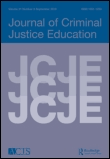
JOURNAL OF CRIMINAL JUSTICE EDUCATION
Transforming Education Through Insightful Criminal Justice ResearchJOURNAL OF CRIMINAL JUSTICE EDUCATION, published by Routledge Journals, Taylor & Francis Ltd, stands as a leading scholarly platform dedicated to the intersection of education and criminal justice. With a robust ISSN of 1051-1253 and an E-ISSN of 1745-9117, this journal provides a vital forum for the dissemination of research, critical analyses, and innovative pedagogical approaches in the field. Indexed in prestigious databases, it boasts impressive rankings—placing in Q3 in Education and Q2 in Law for 2023, with Scopus rankings of #272/1025 in Social Sciences Law and #825/1543 in Social Sciences Education. Addressing the critical needs of criminology professionals and educators, this journal seeks to bridge academic theory and practical application, thus enriching the field with its insightful contributions. While the journal does not offer open access options, researchers and practitioners are encouraged to engage with its comprehensive content to enhance their understanding and teaching within the realm of criminal justice education, fostering a more informed and effective legal system.